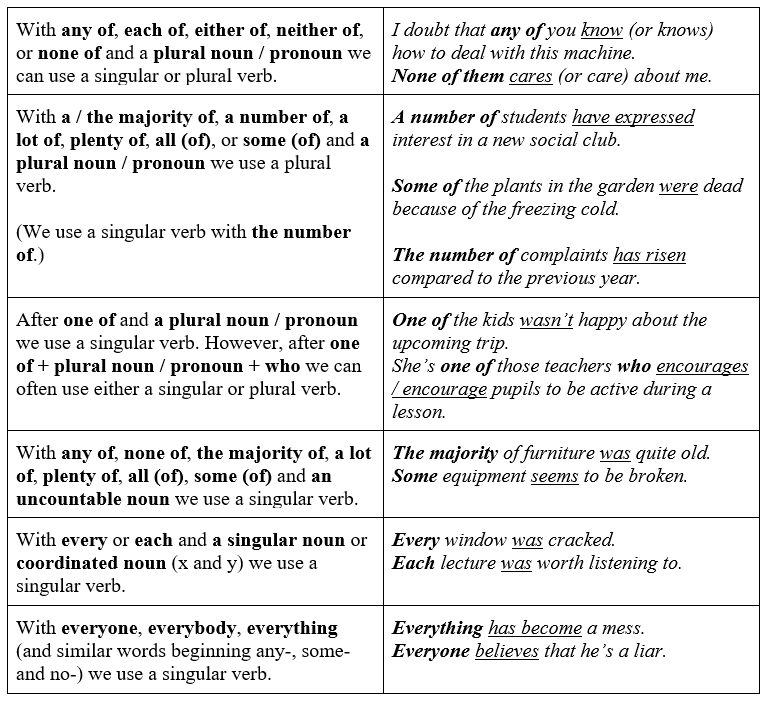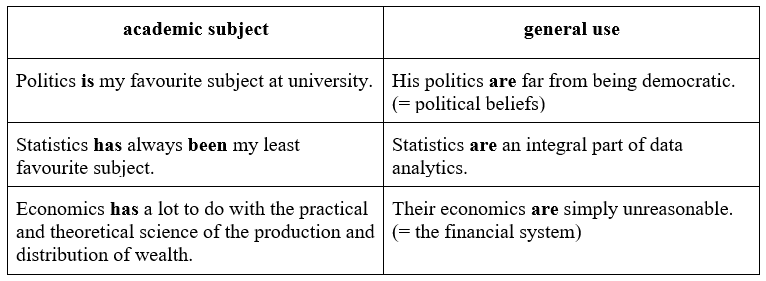The verb always agrees with the subject. When the subject is singular, it is followed by a singular verb. If the subject is plural, it is followed by a plural verb:
He doesn’t have a sense of humour.
The citizens were concerned about the rising levels of organised crime.
When the subject of the sentence is complex, the following verb must agree with the main noun in the subject group:
The only excuse she gave to her daughters was that she was exhausted after a long day at work. (“The only excuse she gave to her daughters” = complex subject, “excuse” = the main noun)
The rule doesn’t change when the verb precedes the subject due to inversion:
Written on the paper were the names of the candidates.
If the subject is expressed by a clause or a phrase with a non-finite form of the verb as the head word, we usually use a singular verb:
To love and to be loved is the greatest happiness of life.
Shouting at your child is the worst method of parenting.
Whoever did that remains a secret.
Yet the situation changes when a subject is expressed by a what-clause. We use a singular verb if the following main noun is singular, and either a singular or a plural verb if the following main noun is plural (although a plural verb is preferred in more formal contexts):
What worries me is her carelessness.
What is needed are precautionary measures. (or more colloquially … is precautionary measures)
Some nouns with a singular form, referring to groups of some kind, can be used with either a singular or plural form of the verb. Such nouns are sometimes referred to as collective nouns:
The crew has / have decided to delay the launch of the ship.
We use a singular verb if the focus is on the institution or organisation as a whole unit, and a plural verb if the focus is on a collection of individuals. You can often use either with very little difference in meaning, although in formal contexts it is better to use a singular verb:
army, association, audience, class, club, college, commission, committee, community, company, crew, crowd, department, electorate, enemy, family, federation, generation, government, group, institute, jury, opposition, orchestra, population, press, public, school, team, university; the Bank of England, the BBC, IBM, Sony, the United Nations (specific organisations).
In some contexts we have to use a singular or a plural form of the verb:

When names and titles ending in -s refer to a single unit, we use a singular verb. Examples include countries; newspapers; titles of books, films, etc.; and quoted plural words or phrases:
The Netherlands is a small country sandwiched between Belgium and Germany in Western Europe.
The Tudors is a historical fiction television series set primarily in 16th-century England.
The New York Times is an American daily newspaper with a worldwide readership.

When a subject has two or more items joined by and, we usually use a plural verb:
My mother and I have been living together for quite a long time.
However, phrases connected by and can also be followed by singular verbs if we think of them as a single item:
Fish and chips is a traditional British dish.
When a subject is made up of two or more items joined by (either) … or … or (neither) … nor …, we use a singular verb if the last item is singular (although a plural verb is sometimes used in informal English), and a plural verb if the last item is plural:
Either the bus station or the entrance to the marketplace is (are) a good place to meet.
My sister and her friends are coming over tonight.
If the last item is singular and previous item plural, we can use a singular or plural verb:
Either the teachers or the principal is (are) responsible for the spread of bullying at school.
In there + be / have, we use a singular verb form with singular and uncountable nouns and a plural form with plural nouns. In informal speech, however, we often use a shortened singular form of be or have (= There’s) with plural nouns:
There have been many complaints about the quality of roads in the city centre.
There’s been lots of visitors lately. (informal)
Plural nouns
Some nouns are only used in plural and thus are used with plural verbs:
Your belongings are in the hall.
The goods have been successfully transported to France.
earnings, belongings, clothes, congratulations, goods, outskirts, overheads, particulars (= information), premises (= building), riches, savings, stairs, surroundings, thanks
Exceptions: “Whereabouts” can be used with either a singular or plural verb. “Police”, “people” and “staff” always take a plural verb:
Police suppose that he may be hiding in Argentina, although his exact whereabouts is / are still unknown.
Staff say that there have been some problems with the software lately.
Plural nouns used with singular verbs
Although the words “data” and “media” (= newspaper, television, etc.) are plural (singular: “datum” and “medium”), they are commonly used with a singular verb. However, in formal contexts a plural verb is preferable. However, such plural nouns as “criteria” and “phenomena” (singular: “criterion” and “phenomenon”) are always used with plural verbs.
All the data is / are classified.
These criteria aren’t applicable to our research.
Uncountable nouns ending in -s
Some uncountable nouns always end in -s and look as if they are plural, but they have a singular verb when we use them as the subject.
means (= ‘method’ or ‘money’); economics, linguistics, mathematics, phonetics, physics; politics, statistics; athletics, gymnastics; diabetes, measles, rabies
The recent news seems promising.

Agreement with measurements, percentages, etc.
With a phrase referring to a measurement, amount, or quantity, we usually prefer a singular verb:
Two kilometres is not a big distance.
- Where have you been? I’ve been waiting for you for fifteen minutes. - Does fifteen minutes seem to be too long to wait for me?
When the first noun in a complex subject is a percentage or a fraction, the verb agrees with the noun closest to the verb:
An inflation rate of only 2% seems to be a minor change but it has enormous consequences.
About 40% of students ask for extra English classes.
When a singular noun can be thought of as either a whole unit or a collection of individuals, we can use either a singular or a plural verb:
27% of the electorate is / are expected to vote in favour of the conservative party.